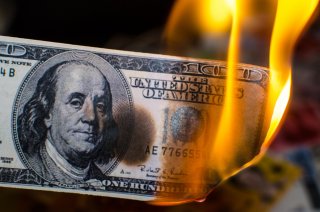The Federal Reserve Keeps Making the Same Mistake
Global instability and domestic economic vulnerability may bring a recession in 2024. Why isn't the Federal Reserve more worried?
Mark Twain allegedly said, “History never repeats itself, but it often rhymes.” He might very well have been talking about today’s Federal Reserve. By hewing to an inappropriately tight monetary policy today, Jerome Powell’s Fed seems to be inviting a hard economic landing in much the same way as Ben Bernanke’s Fed did in 2008 by failing to lower interest rates in a timely manner.
In March 2008, Ben Bernanke dismissed the incipient subprime loan and Bear Stearns’ troubles as matters that were highly unlikely to derail the economy. In fact, as late as August 2008, on the eve of the September 2008 Lehman bankruptcy, the Fed was even contemplating the need for another interest rate hike.
The Fed did so only to find that the bursting of the subprime loan and housing market bubbles precipitated the worst postwar U.S. and global economic recession. The Fed also did so only to find that it would be forced to slash interest rates rapidly to their zero lower bound and to engage in massive quantitative easing to avert the recession morphing into an economic depression.
Fast forward to today, and we find that Jerome Powell seems dismissive of a range of domestic and external economic and geopolitical risks that could derail the U.S. economic recovery.
Instead, he keeps insisting that interest rates remain high for longer to ensure the inflation beast has been slain. At the same time, instead of being forward-looking, he insists that the Fed stick to a backward-looking, data-dependent interest rate policy. Only when the Fed sees the clearest of signs that inflation has fallen to its 2 percent inflation target will it begin to reverse what has been the most aggressive interest rate hiking cycle in the postwar period.
In much the same way as in 2008, Mr. Bernanke largely turned a blind eye to incipient subprime loan and banking system problems. Today, Mr. Powell seems to be overly sanguine about the dangers lurking in the commercial real estate sector and the regional banks.
Never mind that commercial property prices are plunging as vacancy rates have soared to record levels. Vacancies have soared as a result of companies allowing increased work from home after the COVID-19 pandemic. Never mind, too, that the regional banks are heavily exposed to the risk of a wave of commercial property loan defaults. Such a wave could very well occur over the next two years when more than $1 trillion in these loans fall due. This is especially the case since those loans have to be refinanced at considerably higher interest rates than those levels at which they originally were contracted.
Unlike Mr. Bernanke in 2008, Mr. Powell’s Fed is confronted with massive geopolitical risks to the economic recovery, the likes of which we have not seen in decades. Russia’s invasion of Ukraine constitutes the largest European land war since 1945. Israel’s war with Hamas could very well spread to the rest of the Middle East. Meanwhile, the Houthis are threatening to block the vital Red Sea waterway, and China keeps expressing its displeasure over Taiwan, which could further sour already bad U.S.-Chinese relations.
As if all of this were not enough cause for worry, major problems lurk in the rest of the world economy. China’s economy appears to be on the cusp of a Japanese-style lost economic decade following its epic housing and credit market bubble burst. At the same time, Europe’s economy appears to be headed for recession, right when Italy's and Spain’s public debt are at higher levels today than they were at the time of the 2010 Eurozone sovereign debt crisis.
If any of these multiple risks materialize, the United States could be headed for a hard economic landing. Mr. Powell will then have to explain why he had learned so little from Mr. Bernanke’s painful 2008 experience and kept interest rates high for too long when so many downside risks to the economic recovery were in plain sight.
About the Author
Desmond Lachman is a senior fellow at the American Enterprise Institute. He was a deputy director in the International Monetary Fund’s Policy Development and Review Department and the chief emerging market economic strategist at Salomon Smith Barney.
Image Credit: Shutterstock.

